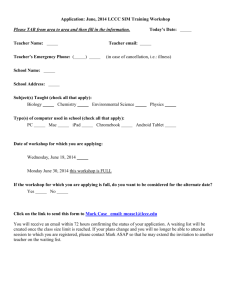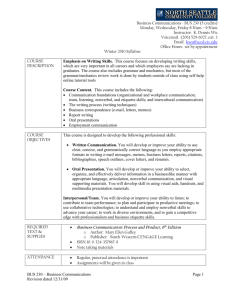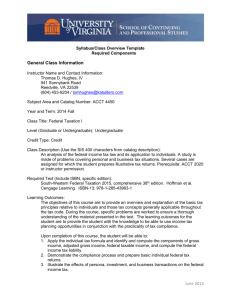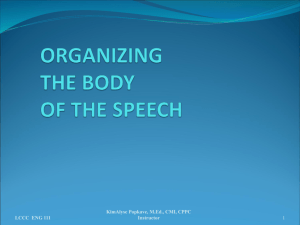speech - Speakers Platform
advertisement
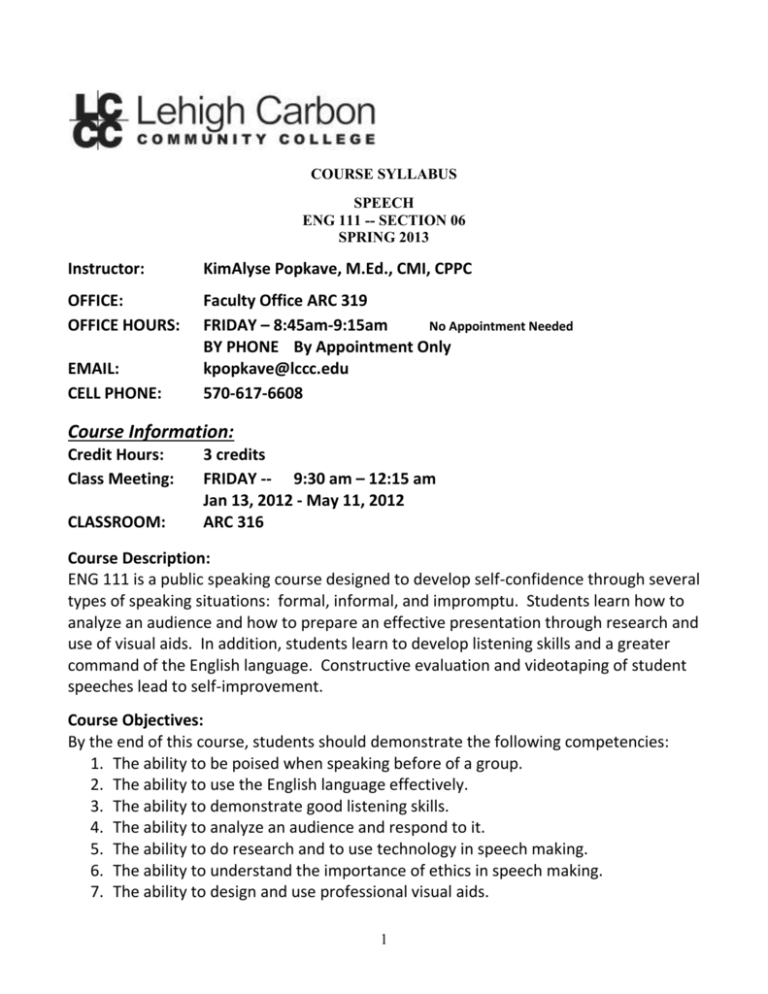
COURSE SYLLABUS SPEECH ENG 111 -- SECTION 06 SPRING 2013 Instructor: KimAlyse Popkave, M.Ed., CMI, CPPC OFFICE: OFFICE HOURS: Faculty Office ARC 319 FRIDAY – 8:45am-9:15am No Appointment Needed BY PHONE By Appointment Only kpopkave@lccc.edu 570-617-6608 EMAIL: CELL PHONE: Course Information: Credit Hours: Class Meeting: CLASSROOM: 3 credits FRIDAY -- 9:30 am – 12:15 am Jan 13, 2012 - May 11, 2012 ARC 316 Course Description: ENG 111 is a public speaking course designed to develop self-confidence through several types of speaking situations: formal, informal, and impromptu. Students learn how to analyze an audience and how to prepare an effective presentation through research and use of visual aids. In addition, students learn to develop listening skills and a greater command of the English language. Constructive evaluation and videotaping of student speeches lead to self-improvement. Course Objectives: By the end of this course, students should demonstrate the following competencies: 1. The ability to be poised when speaking before of a group. 2. The ability to use the English language effectively. 3. The ability to demonstrate good listening skills. 4. The ability to analyze an audience and respond to it. 5. The ability to do research and to use technology in speech making. 6. The ability to understand the importance of ethics in speech making. 7. The ability to design and use professional visual aids. 1 Required Materials: Download & Print Power Points from course website: http://speakersplatform.wikispaces.com/ SPRING 2013 Visual/Audio Aids for Speeches Textbook(s): Beebe, Steven A., and Susan J. Beebe. PUBLIC SPEAKING AN AUDIENCE-CENTERED APPROACH. Seventh ed. Boston: Allyn and Bacon, 2009 Students are required to use book identified for the course. Students are expected to purchase the textbook and all other required materials for the course the first week of class. If students purchase these items from other sources and do not receive them in a timely matter, extensions for late work will be at the discretion of the instructor. Attendance Policy: The attendance policy is strict because your success in the course depends on your ability to participate in all classroom activities. You will fail the course if you miss three classes during the semester. Furthermore, if you are not prepared for class (i.e., you have not completed an assignment) or you are consistently late for class, you will not receive full credit for attendance. Two late arrivals to class will constitute one absence. Instructor’s Additional Attendance Policy: This is a highly participatory class; therefore, attendance is expected. One cannot participate if one is absent. A student may miss up to two (2) classes for extenuating circumstances, provided the student notify me prior to 9:00 am on the day of the absence. Please email me with your reason for absence. I will respond to your email within 24 hours. Or, call my cell phone. Leave a message if I do not answer; I will return your call. If you absolutely must miss a class session when an assignment is due (in the world in which we live, extenuating circumstances do occur), arrangements can be made for you to deliver your speech on an alternate date, but I must be notified at least 24 hours in advance of an absence—NO EXCEPTIONS!!!. If a student intends to withdraw from the course, the student must officially withdraw from the course to avoid course failure. LCCC’s Withdrawal Policy: If you choose to withdraw from this course, you must submit written paperwork to the Enrollment Services Office, AD123. The last day to withdraw with an automatic “W” is within the first five weeks of class for a 15 week class, but will vary for a 12, 9, or 6 week class. If you drop credits or withdraw from all courses financial aid will be adjusted and a balance may be owed to the college. Students with all Ws, Ys, Zs, or Fs, at the end of 2 the semester who have not formally withdrawn will have their financial aid adjusted to the mid point of the semester which may create a balance due at the college or a grant overpayment owed to the U.S. Dept. of Education. All students receiving financial aid should consult with the Financial Aid office before any course withdrawal, as their financial aid may be affected. Instructor’s Withdrawal Policy: Students may withdraw themselves on their own from ENG 111 until the date stated by the registrar (2/14/13). After the self-withdrawal period ends, I will withdraw students ONLY if they are in GOOD ACADEMIC STANDING, and ONLY with a valid reason. Plagiarism A student who submits an assignment that in whole or part has been written by someone else without proper acknowledgement (i.e., quotation marks, internal documentation, etc.) is guilty of plagiarism. Plagiarism is a serious offense. Plagiarized papers and assignments will receive a 0% and the student who commits plagiarism will fail the course. In addition, your instructor will recommend to the Dean of Students that plagiarists be expelled from the college. Please refer to LCCC’s Student Handbook to learn more about the college’s policies on academic honesty. Support Services for Students with Disabilities: Students with disabilities must first contact the Office of Disability Support Services at 610-799-1156 to request course accommodations. Students are also encouraged to personally discuss arrangements with the instructor if there is a need to share medical emergency information or if there is a need for special building evacuation assistance in an emergency situation. Tutoring: Free tutoring is provided for all Lehigh Carbon Community College students. Contact the Educational Support Center (SH150) either in person, online, or by phone (610-7991156) for their tutoring schedule. Library: The Learning Resource Center supports the research and information needs of the students at Lehigh Carbon Community College. These materials can either be accessed online from home or on campus at the Library. The knowledgeable staff looks forward to helping all students meet their educational goals. Instructor Policies: Incompletes: I will not issue a grade of “Incomplete”. 3 Student Rights and Responsibilities Students are entitled to basic rights and are held to basic responsibilities as outlined in the LCCC Student Handbook. Please review this, as all LCCC students are governed by it. Courtesy: A major responsibility for each student in ENG 111 is COURTESY. Students will strive to maintain a courteous atmosphere, conducive to mutual support of learners at all times. Students will be supportive of each other by being good listeners during speeches. This also includes providing feedback to each other during student speeches. Class participation is vital to the success of all students! Courtesy also dictates that if one must leave and re-enter the room when speeches are in progress, that one do so between speakers, and in as unobtrusive a manner as possible. This also applies to when the instructor is speaking. Graded Materials: Students are required to keep a copy of all graded materials from class. Students are encouraged to save a copy of all assignments before submitting them for grading. Cell Phones/Beepers: Must be turned off upon entering class. Food: No food, please. Water, only. Handouts: Students are required to download Power Points from http://speakersplatform.wikispaces.com/. Click the SPRING 2012 link. Office Visits: This is a Communications course. The student is required to communicate with this instructor. The student is required to make at least two (2) office visits to discuss any concerns as to grades, preparation of speeches, topics, etc. If the student does not make these visits, twenty (20) points will be deducted from the final point total. If the student does make the office visits, twenty (20) points will be added to the final point total. First visit must be made no later than March 8, 2013. Assignments and Evaluation: A Preparation Outline must be handed in for each speech. This must be word-processed: Font: Times New Roman, Calibri, or Verdana 12 point. Handwritten pages will not be accepted! SUBMIT VIA EMAIL TO: kpopkave@lccc.edu. Prep Outlines MUST be received no later than 5:00pm the day prior to the speech is due. Attach Prep Outline as a WORD FILE. File Name Format: LASTNAME, FIRSTNAME_ENG111_08_SP1 Eight (8) speeches (each worth 100 points) 4 800 points Daily Class Participation (worth 100 points) 100 points Course Total 900 points Scale: 900 - 810 = A 809 - 720 = B 719 – 630 = C Distance Education: Any computer/technical malfunctions are not an acceptable excuse for late work. Students are expected to make other arrangements to continue with their course (computers available at LCCC). All students are expected to complete a course survey/evaluation. Information will be sent to you through your LCCC e-mail. Once you complete the survey, you will receive an e-mail verifying your survey was submitted. Weather: For class cancellations due to inclement weather, go online to http://www.lccc.edu or listen to the local news or radio stations. LCCC is a smoke free/tobacco free campus. 5 Course Content Introduction Public speaking and its importance to students The public speaker’s obligations to an audience The public speaker as listener The process of preparing a speech Analyzing an audience Choosing a topic Researching and organizing material Preparing visual aids Practicing effectively Student speeches, such as: Personal experience (Narrative) Pet Peeve (Narrative) Informative o (Topic: Pick one topic you will be working with in your career. Do Scholarly Research, utilizing at least three (3) academically research-worthy sources.) Demonstration (Process) Persuasive (Convince, stimulate, or actuate) o (Topic: Pick one controversial issue for which you hold very strong opinions or beliefs. Do Scholarly Research, utilizing at least three (3) academically research-worthy sources. Utilize Monroe’s Motivated Sequence to organize your speech.) Special Occasion (Presentation, Acceptance, After Dinner, etc.) Oral interpretation o Poetry o Prose Group Presentation o (Group meetings outside of class time are of vital importance to the success of the presentations!) Groups should meet at least once per week. Consult Assignment Sheet For All Assignments 6 Tentative Assignment Schedule: Students are responsible to do all assigned reading prior to coming to class. The instructor reserves the right to change this schedule at any time. Please listen carefully. Students are responsible for abiding by all changes. Class Session Friday, 1/11/13 Friday, 1/18/13 Sections In Text To Be Covered Class Activities and Assignments CLASS BEGINS COURSE INTRO Intro To Course; Brief Introductory Speeches SPEAKING_IN_PUBLIC R.A.R.A. IMPROMPTU SPEAKING Chapter 1 Chapter 2 Chapter 3 Chapter 6 DISCUSS GROUP ASSIGNMENT LISTENING ETHICS_&_PUBLIC_SPEAKING GATHERING_MATERIALS SUPPORTING_YOUR_IDEAS Chapter 5 Chapter 7 Chapter 8 SELECTING_A_TOPIC_&_PURPOSE ORGANIZING_THE_BODY_OF_THE_SPEECH BEGINNING_&_ENDING_THE_ SPEECH Chapter 9 PREPARATION OUTLINE WORKSHOP OUTLINING_THE_SPEECH PREPARATION_OUTLINE Friday, 1/25/13 7 Class Session Sections In Text To Be Covered Class Activities and Assignments SPEECH SPEECH #1— Personal Experience (Narrative) SPEECH SPEECH #1— Personal Experience (Narrative) GROUP WORK SESSION GROUP WORK SESSION (Initial Progress Report Due Next Class – One Word-Processed Copy Per Group) Chapter 4 Chapter 10 ANALYZING_THE_AUDIENCE USING_LANGUAGE Chapter 11 Chapter 12 DELIVERY USING_VISUAL_AIDS SPEECH SPEECH #2— Pet Peeve (Narrative) SPEECH SPEECH #2— Pet Peeve (Narrative) SPEECH SPEECH #3— Oral Interpretation SPEECH SPEECH #3— Oral Interpretation Friday, 2/1/13 Friday, 2/8/13 Friday, 2/15/13 Friday, 2/22/13 Friday, 3/1/13 8 Class Session Sections In Text To Be Covered Class Activities and Assignments Chapter 13 SPEAKING_TO_INFORM Group Work Session Group Work Session SPRING BREAK SPRING BREAK NO CLASS NO CLASS Friday, 3/8/13 Friday, 3/15/13 SPEECH #4—Informative (RESEARCH INTENSIVE: At least three Academically ResearchWorthy Sources) SPEECH #4—Informative (RESEARCH INTENSIVE: At least three Academically ResearchWorthy Sources) SPEECH Friday, 3/22/13 SPEECH Friday, 3/29/12 COLLEGE CLOSED COLLEGE CLOSED NO CLASS NO CLASS SPEECH SPEECH #5— Demonstration (Process) SPEECH SPEECH #5— Demonstration (Process) Friday, 4/5/13 9 Class Session Sections In Text To Be Covered Class Activities and Assignments Chapter 14 Chapter 15 SPEAKING TO PERSUADE METHODS OF PERSUASION GROUP WORK SESSION GROUP WORK SESSION Friday, 4/12/13 SPEECH #6—Persuasive (RESEARCH INTENSIVE: At least three Academically ResearchWorthy Sources) SPEECH #6—Persuasive (RESEARCH INTENSIVE: At least three Academically ResearchWorthy Sources) SPEECH Friday, 4/19/13 SPEECH Chapter 16 Epilogue Section A SPEAKING_ON_SPECIAL_OCCASIONS SPEAKING_IN_SMALL_GROUPS Friday, 4/26/13 SPEECH PREP WORKSHOP INDIVIDUAL FACULTY/STUDENT REVIEW Group Presentations SPEECH # 7 Group Presentations Group Presentations SPEECH # 7 Group Presentations FINAL SPEECH SPEECH # 8 Special Occasion Friday, 5/3/13 Friday, 5/10/13 9:00AM – 11:00AM 10 INSTRUCTOR: ENG 111 – SPEECH SPRING 2013 KimAlyse Popkave, M.Ed., CMI, CPPC SPEECH EVALUATION SCALE SITE TERM DATE SPEAKER TOPIC SPEECH # SCHNECKSVILLE SPRING 2013 TOPIC (70) Knowledge of Subject (15) COMMENTS: Development of Topic (10) Are Main Points Clear? (2) Are Main Points Adequately Supported? (2) Are Transitions Effective? (2) Are Internal Previews (Blueprints) Used Effectively? (2) Are Internal Summaries Used Effectively? (2) COMMENTS: 11 Preparation Outline (15) Specific Purpose (2) Central Idea (2) Introduction (2) Main Points (2) Supporting Points (2) Conclusion (2) Bibliography (2) Are Connectives clearly labeled? (1) COMMENTS: Facts (10) Clear? (5) Concise? (5) COMMENTS: Visual Aids (10) Large enough to be seen? (3) Displayed effectively? (2) Explained Effectively? (3) Prepared Effectively? (2) COMMENTS: 12 Ethos (Credibility) (10) Is credibility established in the introduction? Yes No COMMENTS: Delivery (30) Vocal Aspects (9) Rate (3) Volume (3) Articulation & Pronunciation (3) COMMENTS: Visual Aspects (21) Eye contact? (3) Overall command of speech? (3) Self-confidence? (3) Presentation of self? (3) Speaker’s animation & energy? (3) Gestures & mannerisms? (3) Method of presentation? (3) COMMENTS: 13
